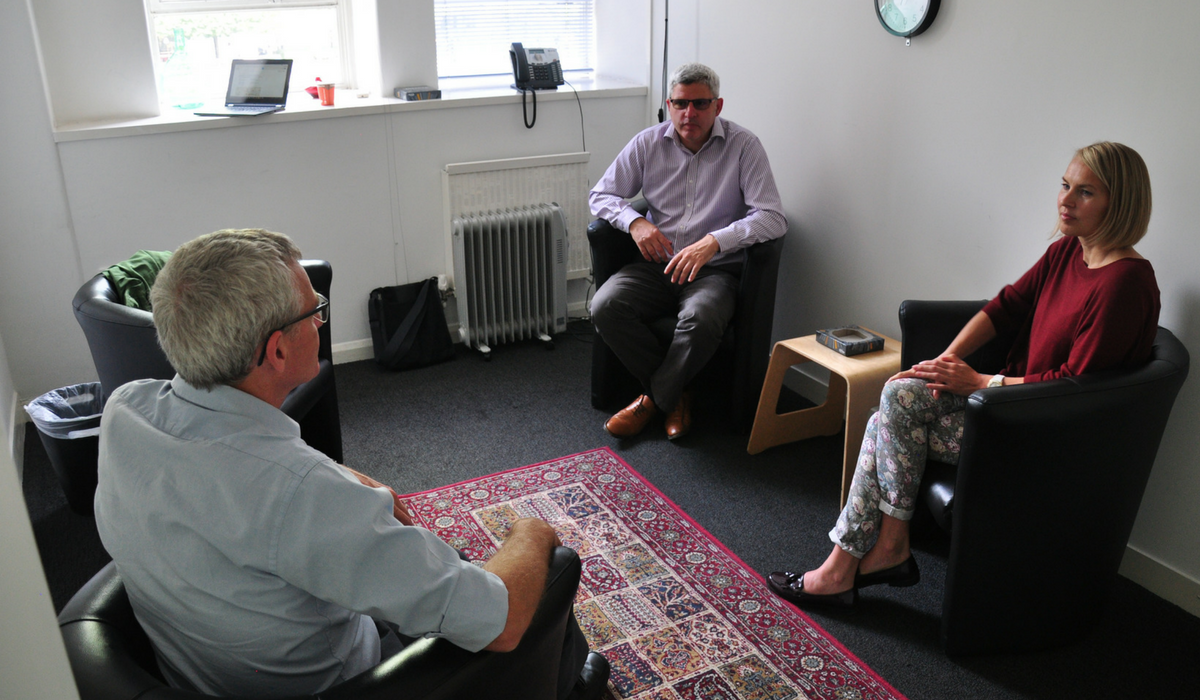
- Relationship Advice
The First Time: What's it like as a counsellor or psychotherapist seeing clients?

A piece based on real life experience by Erica Herrero Martinez
Tavistock Relationships is one of the few training institutions that sources clients for its students.
This means that you are not responsible for finding the cases that will make up your qualifying hours, and you can work as a trainee within the supportive framework of the institution, and with high-quality supervision provided.
Preparation for clinical work
The theory that is taught in seminars provides the student with a variety of approaches to clinical work, and helps them to think themselves into the room. Practical seminars, which focus on role-play exercises, as well as a self-reflective group and a personal therapy, also help to prepare you for clinical work. These elements help to ensure that you are in the right frame of mind to begin to see clients.
The aim of personal therapy and self-reflective practice is to enhance self-awareness, as well as providing an experience of what it may be like to be a client. These components also provide an opportunity to experience some of the theories you are taught in the theory seminars. For example, you are likely to experience ‘projections’ or ‘transference’ in your self-reflective group and in your own therapy.
It may also be important to think about how you behave in the self-reflective group and what this says about you. People will often take on ‘roles’ in these groups — perhaps as the quiet observer or the combative individual. This is all valuable learning ahead of starting clinical work as it will help you gain a better understanding of what your internal conflicts and difficulties might be, and what your strengths are, as well as how other people experience you. This self-awareness is vital to being a good practitioner, as well as to your own self-care.
Typically, students start seeing clients at the beginning of the second year of the MA programme. Before starting clinical work your tutors and seminar leaders will assess whether they think you are ready and, if they think you are, you will undergo an assessment which is a combination of a role-play exercise and an interview.
Practical considerations
Once you are given the go-ahead to start clinical work there are various practical issues the institution will help you to think about. Before starting clinical work, you must have joined a supervision group. You will be assigned a group based on your availability, and even if you have not yet started to see clients it is useful to start attending these sessions as soon as possible to get a sense of what supervision is like, as well as to learn from the experiences of your fellow supervisees.
You should give some thought to when you would like to see clients. Evening slots tend to be the most popular with clients, but it is important that you commit to what you are able to deliver. Remember that this is a weekly commitment and that you will see the same clients at the same time and same location every week.
You will also need to give thought to how many cases you want to take on. Your supervisor and tutor will advise on this, but it is normal practice to consolidate work with one client at first and to build up your caseload gradually. It is helpful eventually to have a number of cases, but taking on too many cases too quickly may feel overwhelming and may not allow you enough time to digest, reflect and process each session.
Your first case
Starting clinical work is perhaps the single most nerve-racking and exciting part of the training. While you might have thought a few months earlier that you were ready to start seeing clients, as you wait in the therapy room for your first clients to arrive, it is quite normal for your confidence to vanish and to feel like everything you have learnt has disappeared from your mind. If this happens, try to remember that your clients are likely to be much more nervous than you are.
It is also worth remembering that your main role, particularly in the first session, is not to make perceptive observations or interpretations but to get a better understanding of your client(s). It is likely that you have decided to study to become a couple therapist because you are interested in other people and their stories. So typically, once your clients start telling you about their dilemmas and conflicts, you are likely to get so engrossed that those initial nerves and feelings of self-doubt disappear.
The training at Tavistock Relationship provides continued support for your clinical work, not least through weekly supervisions which are led by highly experienced couple therapists. The moment of starting clinical work is when the deep learning really starts. Many of the theories you are taught may only ‘click’ once you start seeing clients and it is often at this point that you realise that working as a couple therapist requires a commitment to keep learning not just throughout your training but for the rest of your career.
To see a full list of our training options, view our courses page here.